Papers Advanced Auditing 2023/2024
[1] Jamal, K. and Sunder, S., 2011. Is mandated independence necessary for audit quality?
Accounting, Organizations and Society, 36(4-5), pp.284-292.
Independence in ISAs
● Independence of mind
○ Not affected by influences
○ Allowing to act with integrity
○ Exercise objectivity and Professional Skepticism
● Independence of appearance
○ Avoidance of facts and circumstances
○ Reasonable third party
○ Concludes integrity, objectivity, or Professional Skepticism is compromised
Baseball card certification
● Similarities with Audit
○ Willing to pay for expertise
○ Standards serve as a certification reference
○ Reputation of certifier matters
● Differences with Audit
○ No post-audit negotiations and adjustments
○ No negotiation in market for certifying baseball cards
○ Certifiers are either pure auditors or cross-sellers
Conclusion
● Grade (information), grader-identity (reputation) associated with return
● Market dominated by PSA and BECKETT that cross-sell
● Independent graders do not have a larger market share, and this is not valued
[2] Watts, R.L. and Zimmerman, J.L., 1983. Agency problems, auditing, and the theory of the firm:
Some evidence. The Journal of Law and Economics, 26(3), pp.613-633.
Theory of the firm
● Firm is nexus of contracts (Coase)
● Different contractual arrangements provide different incentives for opportunistic behavior.
● Enforcement of contracts
○ Bonding
○ Monitoring (Audit)
Agency cost (JM1976)
, ● Endogenous: Independent audit reduces incentive problems of the manager and should
exist in earliest firms [JM1976]
● Exogenous: Audit textbooks: recent product of government intervention (e.g., created by
securities acts)
Merchant Guilds (1200s) Regulated companies (1500s) Joint stock companies (1600s)
Bonding: Alderman oath of all Bonding: Treasurer statement of Bonding: sureties and guarantees by
profits receipts officers
Monitoring: audit of expenses Monitoring: audit Monitoring: audit
Auditors: committee of members Auditors: committee of members Auditors: committee of shareholders
Independence: fine and reputation Independence: fine and reputation and directors
Independence: fine and reputation
Conclusion
● Audit existed early in the development of corporations (endogenous)
● Evolved to mandatory audit by first English Companies Act (exogenous)
● Monitoring crucial to formation of firms
● Long survival of audit: efficient tool for organizing a firm
[3] Houston, R.W., Peters, M.F. and Pratt, J.H., 1999. The audit risk model, business risk and
audit-planning decisions. The Accounting Review, 74(3), pp.281-298.
Research question
● Identify conditions under which the audit risk model does (not) describe audit planning and
pricing
● Audit Risk = RMM
● Audit Business Risk = risk of loss to an auditor’s practice due to client relationships (a.k.a.
engagement risk)
Engagement risk
● Litigation risk → (the more users you have the more people might sue you). Private
enforcement
● Regulatory penalties → public enforcement
● Reputation Loss
● Lack of profitability → (auditors don’t get paid if company goes bankrupt)
Audit planning and fees
Hypotheses
● H1: Incremental effect of engagement risk (over audit risk) on planned investment is greater
when risk of irregularities is high than when risk of errors is high.
● H2: Incremental effect of engagement risk (over audit investment) on fees is greater when
the risk of irregularities is high than when the risk of errors is high
Conclusion
● Likelihood of error high:
○ Audit risk model dominates business risk
, ○ No risk premium
● Likelihood of irregularity high:
○ Business risk model dominates audit risk model
○ Risk premium
● Irregularity standard (ISA 240) is incomplete
[4] Low, K.Y., 2004. The effects of industry specialization on audit risk assessments and
audit-planning decisions. The accounting review, 79(1), pp.201-219.
Research Question
● Question: Effect of industry specialization on audit risk assessment and audit planning
● More knowledge: Industry specific experience
● Experiment manipulate level of audit risk (high versus low)
Hypotheses
Industry-matched auditors …
● H1: better discern audit risks (confirmed)
● H2: make more procedure changes (confirmed)
● H3: procedure changes are more sensitive to risk assessment (confirmed)
● H4: procedure changes have higher perceived quality (confirmed)
Conclusion
Industry experience ….
● Affects modification of audit procedures
● Modifications have higher quality
[5] Free, C., & Murphy, P. R. (2015). The ties that bind: The decision to co‐offend in fraud.
Contemporary Accounting Research, 32(1), 18-54.
Fraud categories





